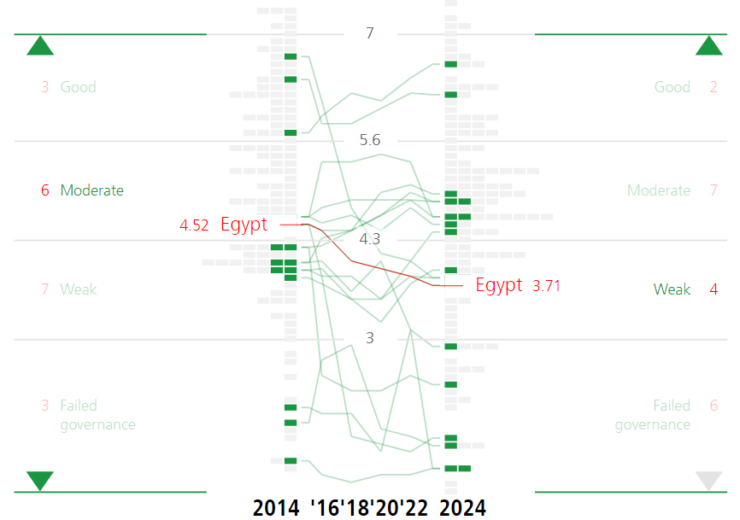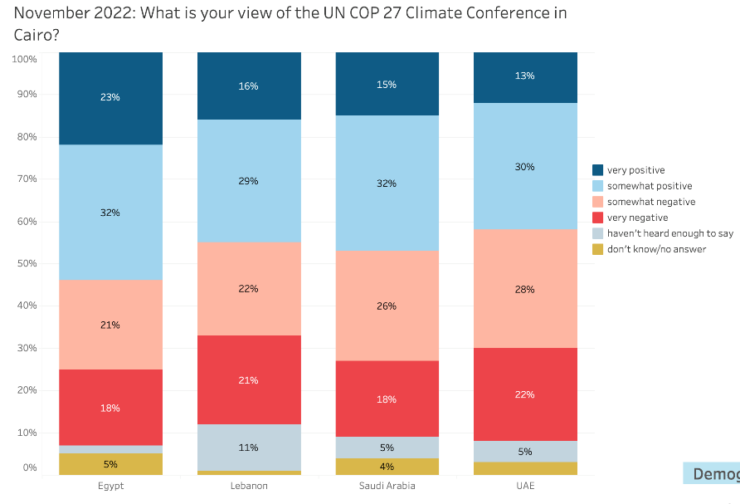Since Egypt promoted sustainable development and industrialization as part of the 2030 Agenda and combined this vision with the ambitious plan for megaprojects aimed at reviving Egypt’s role in the international and regional space, both economically and diplomatically, a series of structural reforms have accompanied the ecology of economic policy. The conditions imposed by the IMF to provide Egypt with access to loans to support the industrialization process involved the expansion of the private sector and the withdrawal of the state from the national economy after decades of interference since the 1950s. In fact, the size of the private sector was still 26.3 percent of GDP in 2023, according to the World Bank. Thus, despite loans and access to international credit from donors, including the US in 2024, the size of the private sector has not grown as expected. In political terms, these economic maneuvers also attempted to accompany forms of ‘democratization’ of the status quo, although the idea of democracy vis-à-vis democratization in the Middle East remains exogenously conceived and as such is widely held to embed neo-colonial trajectories. Looking at the political structures, it becomes clear that the consensus on the status quo is different if one distinguishes between the international and the national perspective. Overall, from a political perspective, the sustainable development approach includes practices of forced eviction, land confiscation for the 4th generation cities planned in Upper Egypt and Sinai. From an external perspective, the persistence of such practices impacted the international categorization of local institutions. In 2024, the deterioration of institutions showed the weakness of governance as the country evolved from moderate to weak (Fig. 1), while the system itself evolved from a defective to a very limited hard-liner autocracy in 2024 (Fig. 2).

Fig. 1. Egypt’s governance score 2014-2024. Source BTI, 2024

Fig.2. Categorization of Egypt’s authoritarianism in 2024. Source: BTI, 2024
Thus, the discourse of authoritarian mitigation through reforms in Egypt, taking a comparative international versus local perspective, can be considered more a diplomatic-cosmetic response of local institutions to international pressures. This takes place in a framework of “financial dependence” that results from mega-projects and the nationalization of the industrial compound. Instead, overturning the legitimacy-illegitimacy paradigm that intertwines civic participation to the environment and the status quo, the perpetuation of the economic crisis seems to be the factor that more than other determinants interferes with the Egyptians’ acceptance of the status quo and its idea of perpetuation, rather than the idea of an inclusive urban-environmental project, as at the core of the Social Development Goals. As data from the Arab Barometer Wave VII (2021-2022) discloses, the nature of the political system is considered not as a core determinant at 49 percent insofar as institutions fix economic problems (i.e. lower prices for commodities or in alternative revisions to subsidies, lower inflation rate, arrest in the free floating of the currency). Thus, rather than the nature of the institutions, is the performance that seems matter the most. This level of agreement is shared on a regional level, but remains more preponderant in Egypt although only 18 percent of citizens are in a strong agreement.

Fig. 3. Agreement with the nature of the government in the Middle East. Source: Arab Barometer, Wave VII
This view was reinforced in 2022 when the field of inquiry questioned the state’s environmental policy agenda and the effectiveness of the Conference on Climate, COP27. Data obtained from the Washington Institute’s for Near East Policy (Fig. 4) reveals that 23 percent of Egyptians had a very positive view of COP27 while 32 percent had a somewhat positive view of it. COP27 sparked national and international criticisms for the state-centralized control of the overall conference and the exclusion of green movements and ENGOs from the decision-making process and table. I wrote elsewhere about the limitations COP27 would pose, outlining how the conference greenwashed capitalist morale, by remaining quite exclusionary and supportive of larger neocolonial trajectories. Despite this, from a domestic contextualization that centralizes needs over the critique, the “positive” frame of COP27 can be considered as dependent on societal expectations that the overall state-sponsored green transition agenda would determine on Egypt’s households economic and financial capacity.

Fig. 4. View of COP27. Source, Washington Institute for Near East Policy
Indeed, the nexus between environmental development-ethics in ecology-ENGOs versus economic recovery suggests an inversion in the trend amongst Egyptians. While the incumbent’s ecological manifesto and the reforms on citizen participation in the context of sustainability and shared prosperity indicate an increased social awareness of environmentally friendly measures, some common ecological measures, such as the recycling of plastic bottles in Egypt, are perceived as being more intertwined with the philosophy and necessity of saving money, as reported by the Arab Barometer for years 2021-2022, than with the goal of acting in support of the environment. According to Egyptians, the main reason for recycling is cost-driven at 70 percent. Environmental awareness is not contemplated at all (Fig. 4). Thus, what these data question is the opportunistic morale of development.

Fig. 5. Reasons for recycling plastic, 2021-2022. Source: Arab Barometer Wave VII
These data do not underpin that authoritarian governance proves to be more effective and bottom-up legitimized, when compared to more liberal governments, nor that consensus towards the government has increased over years, as the opposite happened on a larger scale. Yet, the trilogy of environment-institutions-society in Egypt discloses important aspects when the reorganization of civic participation along the spectrum of sustainability, reforms and environmentalism are intertwined. This work does not elaborate on the above data in absolutistic terms, yet they open to domestic fragmentations on priorities for Egyptians, as they mainly remain confined to the economic-financial realm. Does political mitigation through environmentalism really matter to Egyptians? The combination of aspects on CSO, in the framework of limitations posed by Law No. 149 on NGOs, when combined with the nature of political structures certainly disclose that institutional opening to civic participation through the prism of sustainability and development attains more the realm of legitimacy than the process of rebuilding the societal pact by aligning with the Social Development Goal no. 17.
This is Part Two of the blog series by Dr. Polimeno. Read Part One for a deeper understanding of the challenges facing civic participation and development in Egypt.
Dr Maria Gloria Polimeno is Research Fellow at SOAS University of London and author of “Egypt and the rise of fluid authoritarianism: political ecology, power and the crisis of legitimacy”. Manchester University Press (2024). The views expressed in this piece are her own.


